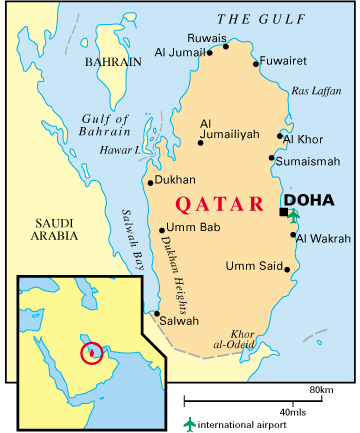Latest archaeological digs may revamp Qatar’s entire history
 Doha (Qatar), July 29 : Recent excavations conducted in Qatar has resulted in a substantial number of new sites being discovered and significantly more archaeological research in the region, which may revamp the whole history of the nation written so far.
Doha (Qatar), July 29 : Recent excavations conducted in Qatar has resulted in a substantial number of new sites being discovered and significantly more archaeological research in the region, which may revamp the whole history of the nation written so far.
According to a report in The Peninsula On-line, there has been a notable increase in the amount of archaeological field work being conducted in Qatar covering the ancient to the Islamic periods.
The research is bringing important new information to light.
In October last year, Qatar had become the first country in the region to implement the Global Imagery System for archeological studies as part of a research by QMA and the University of Birmingham, United Kingdom.
This research involved the use of remote sensors and geospatial modelling to reconstruct the former onshore and offshore landscape environments in Qatar.
Through this research, Qatar aims to develop a world-class Qatar National Historic Environment Record (a record of all archaeological sites) as a major step to guiding future research across a range of disciplines.
The research is leading to the discovery of significant numbers of new archaeological sites as per the reports at British Museum.
Once done, the record could also revamp the whole history of the nation written so far.
"This forms part of the core for our long term strategy for the protection of our historic environment," said Sheikh Hassan Al Thani, Vice Chairman, QMA.
"The establishment of Qatar National Historic Environment Record provides an educational tool that assists planning decisions and will affect how the historic resource is managed for future generations," he added.
So far, excavations at Ras Aburuk have revealed some of the earliest stone tools found in Qatar or indeed the Arabian Peninsula.
Also, a German team excavated part of a vast prehistoric cairn field of Umm Al Maa, some 80km north-west of Doha, thought to date between 100 BC and 100AD.
An exploratory programme of archaeological survey work, excavations and environmental studies was undertaken from January to May this year.
The extraordinary complexity of the natural and human environment encountered through this work is being revealed, and suggests that in the future many more rewarding outcomes can be expected in the study of Qatari archaeology, history and heritage.
"This event offers the opportunity to raise awareness about the diversity of cultural heritage in Qatar and the recent developments in conservation and protection," said Abdulla Al Najjar, CEO, QMA. (ANI)